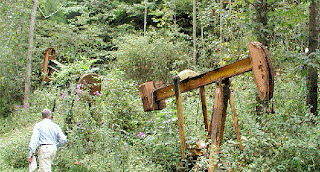 |
| This ain't no desert, Jason |
As we often do with questions (and "answers") related to this topic, we went straight to the oil industry glossary at Schlumberger.com, where we found this succinct (and accurate) definition:
"An accumulation, pool, or group of pools of hydrocarbons or other mineral resources in the subsurface. A hydrocarbon field consists of a reservoir in a shape that will trap hydrocarbons and that is covered by an impermeable, sealing rock. Typically, the term implies an economic size."
We're good with that. The site should have been good with it too, although we know well that content farms demanded more "information" (we use the term loosely) of their contributors in order to meet some predetermined minimum word count. Well, Chavis complied with their demands, in the process revealing near-complete ignorance of his topic.
Jason's failure to inform began with the first sentence in his post:
"A region of land in which vast amounts of oil is extracted from the ground is known as an oil field."
The evidence of his ignorance is the word "vast," which is rather an overstatement. Although Chavis was apparently fixated on fields like Saudi Arabia's super-giant Ghawar Field, such behemoths are the exception rather than the rule. Many fields are one tenth of one percent the size of Ghawar's 50 billion barrels. Fifty million barrels is big enough to make a few bucks from if economic and geologic conditions are favorable. It ain't "vast," though.
Chavis continued throughout his post to share his personal misconceptions and pass along multiple bits of misinformation, including such garbage as,
- "...oil wells [are] large machines that bore into the earth to extract petroleum or crude oil." – Uh, no, Jason, a well is a hole in the ground. The "large machines that bore" are drilling rigs, which must be removed before the well can "extract petroleum or crude oil"; terms that, by the way, are the same thing.
- "The petroleum is naturally trapped by rock and soil into large pools, which make it possible to set up numerous oil wells in order to permeate the surface." – We just bet Jason thought the pools are "underground lakes." Oh, and by the way? Learn what "permeate" means before using it!
- "...the fact [is] that crude oil is found most readily in desert areas or underneath the ocean floor." – "Desert" has nothing to do with where oil accumulates; and offshore oil is not found at random locations "underneath the ocean floor," it is found near the continents where sediments eroded on land have been dumped by rivers.
- "The oil field rig, the machinery which pumps the oil from the wells, is large and requires extensive manufacturing." – It's obvious here that Chavis confused drilling equipment with production equipment. Once again for those ignorant of the oil business, a drilling rig does not produce oil. Heck, some WiseGEEK drone (maybe Chavis himself) even included an image of a "pumpjack oil well"... as opposed to a drilling rig...
- "Oil fields are generally remote and situated far from civilization..." – We guess that comes a surprise to the people of Long Beach (CA), New Orleans, or Houston and Dallas, Texas. Duh.
- "Since the oil fields are distant from civilization, self-sufficient communities are created within the oil field..." – More of the same bushwa about deserts and oceans, we guess. Perhaps Chavis was confused by offshore platforms or maybe compounds like Cabinda and Prudhoe Bay. Who knows?
- "Oil fields are scattered across the globe in many diverse regions. Some are situated in hot deserts such as those in Texas and frigid climates as in Alaska." – Again with that "deserts" business...
The closest Chavis came to explaining what an oil field is (instead of his misconception of what they are) was a phrase buried in the chaff of paragraph one: "petroleum is naturally trapped by rock and soil." Leaving aside for the moment that "soil" has nothing to do with traps, this is where Jason could have actually been informative. This business of "trapping" in a reservoir is covered in the Schlumberger definition above, as are mentions of trap shape and a sealing layer. The presence of reservoir, trap, and seal are defining elements of an oil field; not "deserts" as our Dumbass of the Day seemed to think. He glossed over that information, however, in favor of... well, in favor of showing people how little he actually knew.
More's the pity.
SI-OIL
No comments:
Post a Comment